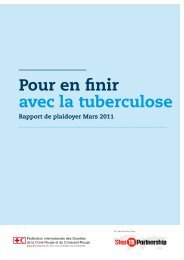Thailand - Stop TB Partnership
Thailand - Stop TB Partnership
Thailand - Stop TB Partnership
You also want an ePaper? Increase the reach of your titles
YUMPU automatically turns print PDFs into web optimized ePapers that Google loves.
curricula, 125 and by doing more to ensure in-service training and continuing education for<br />
doctors and nurses on the latest developments in <strong>TB</strong> care. In a recent example of policy-oriented<br />
research, researchers from the <strong>TB</strong> Cluster assessed curricula from 71 nursing schools<br />
and found that an average of just 15 minutes was devoted to <strong>TB</strong>. 126 Spurred by these findings,<br />
a new curriculum and teaching guidelines were developed and are being disseminated. <strong>TB</strong><br />
Cluster staff believe that this research has sparked greater interest in the importance of<br />
increasing the level of training and teaching on <strong>TB</strong> at other institutions as well; for example,<br />
a <strong>TB</strong> component has been added to Mahidol University’s annual HIV/AIDS training for<br />
nurses. 127 The government should consider urgent measures to improve the incentive package<br />
for <strong>TB</strong> workers to attract new staff, ensure high-quality <strong>TB</strong> services through appropriate<br />
and ongoing training, decrease high levels of staff turnover, and enhance the prestige of<br />
<strong>TB</strong> work.<br />
Budgeting and expenditures<br />
Health reforms have made it more difficult to obtain an accurate and comprehensive picture<br />
of annual government spending on <strong>TB</strong> care.<br />
The universal coverage system places a priority on preventive care rather than<br />
treatment of illnesses. As a result, <strong>TB</strong> treatment is now included in the “essential package<br />
of care.” Provincial and district hospitals receive funding from the MoPH to cover the costs<br />
of providing the essential package of care, but without any specification as to how much<br />
funding is required to ensure <strong>TB</strong> control. According to some officials, this situation has<br />
resulted in a lack of transparency and consistency in decision making on health budgets<br />
and in the underfunding of <strong>TB</strong> in some areas since “it’s a struggle to get <strong>TB</strong> prioritized.” 128<br />
This has had a particularly serious impact on budgets for training, monitoring, and supervision<br />
since these activities are funded at the discretion of provincial medical officers, who<br />
are under pressure to cut costs.<br />
Funding for the NTP is provided from the MoPH budget. Between 1991 and<br />
1998, despite a severe financial crisis in 1997, 129 per capita NTP expenditure on <strong>TB</strong> control<br />
remained roughly constant in absolute dollar terms. 130 More recently, the NTP budget has<br />
been reduced significantly, from $6.1 million (231 million baht) in 2002 to $4.7 million<br />
(178 million baht) in 2005, compared to the total estimated cost of $10 million per year<br />
(378 million baht). 131<br />
However, the NTP budget figure reported to the WHO for 2005 only reflects<br />
the budget managed by the <strong>TB</strong> Cluster, and not total spending on <strong>TB</strong> control. The apparent<br />
reduction in NTP funding does not reflect the amounts allocated to <strong>TB</strong> control at the<br />
PUBLIC HEALTH WATCH MONITORING REPORTS 57



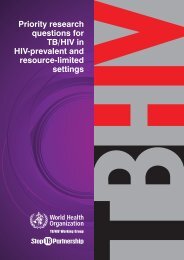
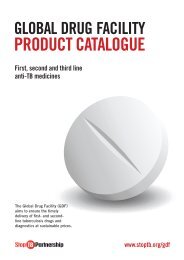
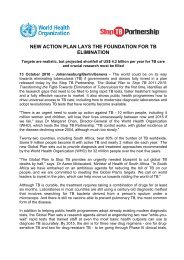
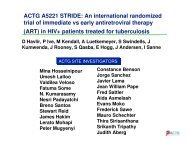
![Global Drug Facility Annual Report 2011 [.pdf] - Stop TB Partnership](https://img.yumpu.com/26788745/1/184x260/global-drug-facility-annual-report-2011-pdf-stop-tb-partnership.jpg?quality=85)

![Concept note on national stop TB partnership [.pdf]](https://img.yumpu.com/26788741/1/184x260/concept-note-on-national-stop-tb-partnership-pdf.jpg?quality=85)

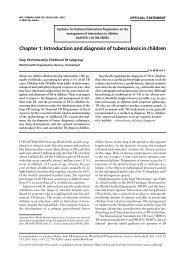
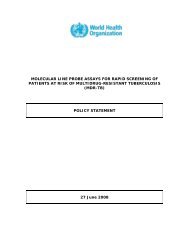
![2005 and Challenges for 2006 - 2015 [.pdf] - Stop TB Partnership](https://img.yumpu.com/26788674/1/190x245/2005-and-challenges-for-2006-2015-pdf-stop-tb-partnership.jpg?quality=85)
![Brochure (French) [.pdf] - Stop TB Partnership](https://img.yumpu.com/17234792/1/190x91/brochure-french-pdf-stop-tb-partnership.jpg?quality=85)

